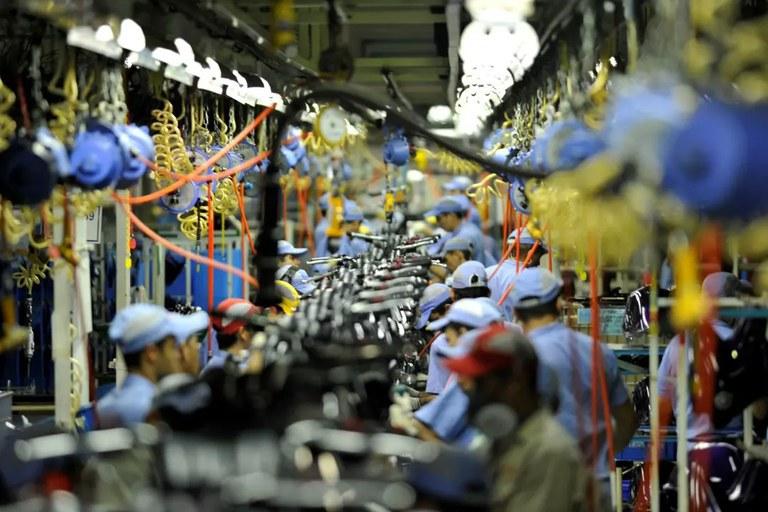Industry and development: strategies to break away from peripheral status

Indústria brasileira - Foto: CNI/José Paulo Lacerda
There is no doubt that industry plays a central role in the economic development of any nation. Historically, countries that have become economic powers have invested heavily in the industrial sector, promoting technological innovation, the creation of skilled jobs and sustainable growth. I would highlight the case of Brazil, which followed a path that compromised the possibilities of economic and social development through industrialization.
In 1956, Brazil reached an important milestone in its economic development: the income generated by industry surpassed that of agriculture. However, this advance did not represent the transition to a developed country. Despite industrial growth and the creation of more skilled jobs, agriculture continued to play a crucial role in the economy. It supported urban centers by providing cheap labour and surplus goods, as well as financing urban industrialization. Thus, the agricultural sector, with its characteristic severe labor exploitation, remained the basis for industrial growth and continues to be a prominent sector for the national economy and politics.
In addition, the transition from a slave economy to a capitalist one after the abolition of slavery maintained unequal and exploitative labor relations. Social inequalities stemming from colonial structures persisted throughout the industrialization process, reinforced by the state and the ruling class. These inequalities facilitated the maintenance of an unequal economic structure in urban and rural areas that persists to this day.
The state played a significant role in Brazil's industrialization, as in any other country operating under capitalism, adopting public policies aimed at financing the sector and structuring production chains. It acted as a mediator, ensuring that industrial capital was the engine of economic growth, promoting the transfer of resources from the agricultural sector to urban industrialization. Although this strategy facilitated the modernization of industries, it also perpetuated the exploitative model in rural areas.
In this way, the industrialization process enabled the development of sectors such as the automotive, shipbuilding, chemical and metal-mechanical industries. This model was financed by foreign capital, which led to technological dependence, limiting the country's capacity for innovation. Furthermore, the urbanization resulting from this process was not accompanied by improvements in essential services such as health, education, housing and mobility, leading to precarious living conditions. Despite some progress, structural problems such as inequality remained.
From the 1980s onwards, the external debt crisis, monetary stabilization plans, and the opening up of trade in the 1990s negatively impacted the industrial sector, leading to factory closures and a reduction in industrial employment. In the 2000s, attempts to revive industry, such as the Productive Development Policy (2008) and the Greater Brazil Plan (2011), failed to overcome structural challenges, even though they promoted important strategic actions. The economic downturn, lack of investment in innovation, and international competition resulted in a drop in industry's share of GDP, which fell from 27.4% in 2010 to 22% in 2023, according to IBGE data.
Brazilian industry has yet to fully fulfill its role in overcoming dependency and promoting the expected economic and social development. Political choices have taken their toll. As a result, it is currently an industry with low capacity to generate quality jobs and sustain a powerful process of economic and social development.
Brazil’s industrialization process reveals the contradictions and challenges that have marked the country’s development. However, its subordinate and dependent position relative to central economies is not unique to Brazil. Other countries in the Global South face similar dilemmas in their industrial sectors, despite being shaped by their own historical, economic, social and cultural contexts. In addition, several peripheral nations have not even managed to establish a significant industrial base, which perpetuates their dependence and their role as a primary goods supplier in the global economy.
However, it is important to note that no country has achieved long-term development without a dynamic and relevant industrial sector. Therefore, a robust Industrial Policy is essential, one that overcomes the historical problems of industrial development in peripheral countries, reduces external dependence, and guarantees national sovereignty in strategic sectors.
Re-industrialization/industrialization, depending on the country, must also be geared towards meeting the urgent demands of the population, ensuring essential goods and services to improve the standard of living of Brazilian society, such as health, housing, sanitation, mobility and accessibility, connectivity, food security, the spread of renewable energies, as well as the promotion of adequate infrastructure, among other high-impact social demands. Industrial development must be seen as a means to achieve social development and not an end in itself. In addition, the process must be aligned with policies to decarbonize the economy, preserve the environment, and invest in renewable and affordable energy. It is also essential that it generates quality jobs and contributes to reducing inequalities in the labor market and poverty.
Therefore, the debate on how to promote an industry that is guided by economic and social demands—one that fosters sovereign and environmentally sustainable development, while promoting income distribution and reducing inequalities—is an urgent need for the countries of the Global South.
Industry, as the fundamental engine of economic and social growth, remains central to the future of this group of countries, but with a new approach. This requires consistent, long-term policies. The challenge is great, but not impossible.
*Adriana Marcolino is a sociologist and Technical Director of DIEESE, the Inter-Union Department of Statistics and Socio-Economic Studies, Brazil.